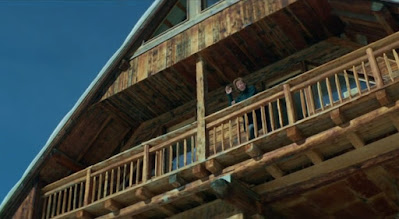or
An Empty Space Must Be Filled
or
If a Teacher Falls Off a Roof and There's No One There to See It, Does It Make a Case?
The winner of the Palme d'or at the 2023 Cannes Film Festival, Anatomy of a Fall couldn't be simpler: Did the novelist (Sandra Hüller) kill her depressive husband (Samuel Theis)? Or did he simply fall from the attic of the chalet they share near Grenoble accidentally? I could go over the facts of the case and the circumstances but the film does a very good job of that, and an even better job of showing how an aggressive prosecution (and most of them are) can confuse, obfuscate, make mountains out of molehills and accentuate the trivial in the pursuit of what everybody agrees is "justice."
But "justice" is blind and the devil is in the details. "Justice" is supposed to be blind as regards race, creed and the like, but when justice is blind to the circumstances—that is to a circumstance that has no witnesses—there is a rush to fill the void. "Nature abhors a vacuum," goes the saying, but so does jurisprudence. So, without the benefit of being there, there comes a rush of speculation, of "expert evidence," of theory, none of which is fact and is viable as "hearsay" evidence. It's not real. It's not what happened. It's what could have happened, and that opens up a world of possibilities that threaten to swamp the one Truth.So, we have a horrible circumstance—a marriage, which has its share of conflicts—comes under scrutiny when one of the couple dies. There were no witnesses—the wife was asleep in her bedroom. The couple's son (Milo Machado Graner), who has impaired vision, was on a walk with his guide-dog, and comes home to find his father, who had been working upstairs, on the ground, bleeding, and, if not dead, close enough to succumb to the injuries sustained before help arrives. The autopsy is "inconclusive." as to how he died, other than he is dead, and their is a grievous wound to the head, which could have been caused by the fall or could have been inflicted before the fall by...someone.Anyone who's seen even one episode of "Dateline" knows that the suspicion turns first to the surviving spouse if it is a "suspicious death" (or "morte suspect" as the case is being tried in a French court—the film jumps back and forth between English and French, so use your closed-captioning), and unless another explanation can be found conclusively, it will stay there until it can be proven otherwise, in which case there is a presumption of guiltiness unless proven innocent. In that topsy-turvy situation, everything becomes fair game as far as means, motive, and benefit, and at that point, prosecution and defense spar by blaming victims, compounding a tragedy as a matter of course.And that's what Anatomy of a Fall is all about: how a system designed to right wrongs and punish the guilty can turn into "crazy-town" at the whims of the motivations of the litigants, rather than coming to a conclusion of fact. It becomes a blood-sport and a scorched earth battle that serves no one but getting a "winner." And, as another court-room drama, Compulsion, put it, it's more than a little ironic that a prosecution trying to determine premeditation that the defendant "planned and schemed" when there "are officers of the court who for months have planned and schemed and contrived" and who hang on the supposition that something may be "improbable...but not impossible."Writer-director Justine Triet shows what can happen when thumbs start being put on justice's scale and a legal system becomes weaponized. One wants to think that intentions are for the best, but the evidence shows that though it may be improbable...it is not impossible.






No comments:
Post a Comment